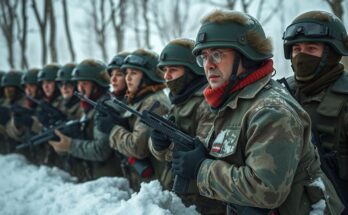Turkey has initiated airstrikes in Kurdish-held regions of Syria and Iraq in retaliation for an attack on a defense manufacturing facility that killed four and injured several others. The strikes reportedly resulted in the deaths of 12 individuals, including children. The situation is further complicated by the intertwined relationships between the U.S., Turkey, and Kurdish forces, as well as ongoing peace negotiations involving the imprisoned PKK leader Abdullah Ocalan.
Turkey has initiated airstrikes across Kurdish-controlled areas in Syria and Iraq as a countermeasure to a lethal assault on a state-owned defense facility in Ankara, which resulted in the deaths of four individuals and injuries to numerous others. The attack, attributed to the Kurdistan Workers’ Party (PKK), prompted Turkish President Recep Tayyip Erdogan to strongly condemn it as a “nefarious” act targeting Turkish Aerospace Industries. In response, Turkish military actions reportedly resulted in significant casualties among the Kurdish population, with the Syrian Democratic Forces (SDF) declaring that a total of 12 individuals, including two children, lost their lives, and an additional 25 sustained injuries from the air and artillery strikes. Turkey’s defense ministry claimed the targeting of 47 “terrorist spots” in both Syria and Iraq. SDF commander General Mazlum Abdi criticized the Turkish military campaign as indiscriminate, emphasizing that civilian establishments, including medical facilities, were struck during the operations. Amidst the ongoing military engagement, approximately 900 U.S. troops remain in the region as part of the coalition against ISIS, with the SDF serving as a primary partner in northeastern Syria. As of Thursday morning, there had been no official statements from the U.S. Department of Defense regarding the Ankara assault or the subsequent Turkish strikes. It is pertinent to note that the Turkish government classifies the U.S.-backed SDF and its associated body, the YPG, as closely connected to the PKK, an organization recognized as a terrorist group by both Turkey and the United States. Despite the absence of claims regarding the Ankara attack, the incident coincided with peace discussions involving the imprisoned leader of the PKK, Abdullah Ocalan, suggesting a potential path towards resolving the decades-long conflict. Further signals of potential negotiation arose when Ocalan’s nephew, Omer, articulated a message indicating the leader’s willingness to reconcile and resolve the longstanding hostilities. In a related development, government ally Devlet Bahceli of the Nationalist Movement Party proposed inviting Ocalan to address the parliament and indicated that leniency in his imprisonment could be extended provided the PKK disbands.
The recent tensions between Turkey and the Kurdish factions in Syria and Iraq have their roots in a longstanding conflict involving the PKK, which has been engaged in an insurgency against the Turkish state since the mid-1980s. The PKK has been designated a terrorist organization by Turkey and the U.S. and operates largely from bases located in northern Iraq. Turkey’s retaliation follows a specific attack targeted at a military establishment in Ankara, deriving significant national attention and prompting a fierce military response. The ongoing presence of U.S. forces in the region complicates the dynamics, reflecting international implications regarding the support for Kurdish forces in the fight against ISIS, and the tenuous balance that exists between Turkish national security interests and regional stability.
In summary, the escalation of military actions by Turkey in response to the attack on its defense firm has resulted in substantial civilian casualties among the Kurdish population in Syria. The incident brings to light the ongoing complexities of the Turkish-Kurd conflict and highlights the fragile nature of peace negotiations that have emerged amidst cyclical violence. As discussions regarding disarmament and reconciliation unfold, the role of external actors, particularly the United States, continues to be crucial in navigating this precarious situation and seeking a diplomatic resolution to the enduring conflict.
Original Source: www.cbsnews.com




